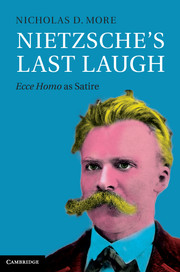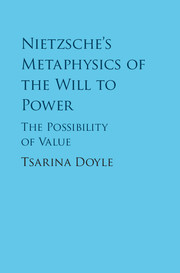Nietzsche's Last Laugh
Nietzsche's Ecce Homo was published posthumously in 1908, eight years after his death, and has been variously described ever since as useless, mad, or merely inscrutable. Against this backdrop, Nicholas D. More provides the first complete and compelling analysis of the work, and argues that this so-called autobiography is instead a satire. This form enables Nietzsche to belittle bad philosophy by comic means, attempt reconciliation with his painful past, review and unify his disparate works, insulate himself with humor from the danger of 'looking into abysses', and establish wisdom as a special kind of 'good taste'. After showing how to read this much-maligned book, More argues that Ecce Homo presents the best example of Nietzsche making sense of his own intellectual life, and that its unique and complex parody of traditional philosophy makes a powerful case for reading Nietzsche as a philosophical satirist across his corpus.
- Provides the first section-by-section analysis and commentary of the entire text
- Considers the reception and scholarly treatment of Nietzsche's infamous, so-called autobiography
- Offers the first translations of correspondence and alternate Ecce Homo drafts that bear on the meaning and significance of Nietzsche's last original composition
Reviews & endorsements
"This book-length study of Nietzsche's final book, his venture into autobiography, mounts a persuasive argument. More demonstrates not only that Ecce Homo, that problematic stepchild of Nietzsche studies (by turns and at once, self-glorifying and self-parodying), is a masterful work of satire, but that all of Nietzsche's corpus after Die Geburt der Tragödie can effectively and profitably be read, following the lead of this final book, as satire …"
Daniel T. O'Hara, German Quarterly
Product details
May 2014Hardback
9781107050815
235 pages
235 × 157 × 18 mm
0.47kg
Available
Table of Contents
- Prologue
- Part I. What is Ecce Homo?: Introduction
- 1. Nietzsche deigns to read himself
- 2. A question of genre
- Part II. What is the Meaning of Ecce Homo?:
- 3. Ecce Homo as satire: analysis and commentary
- Part III. What is the Significance of Ecce Homo?: Conclusion.





